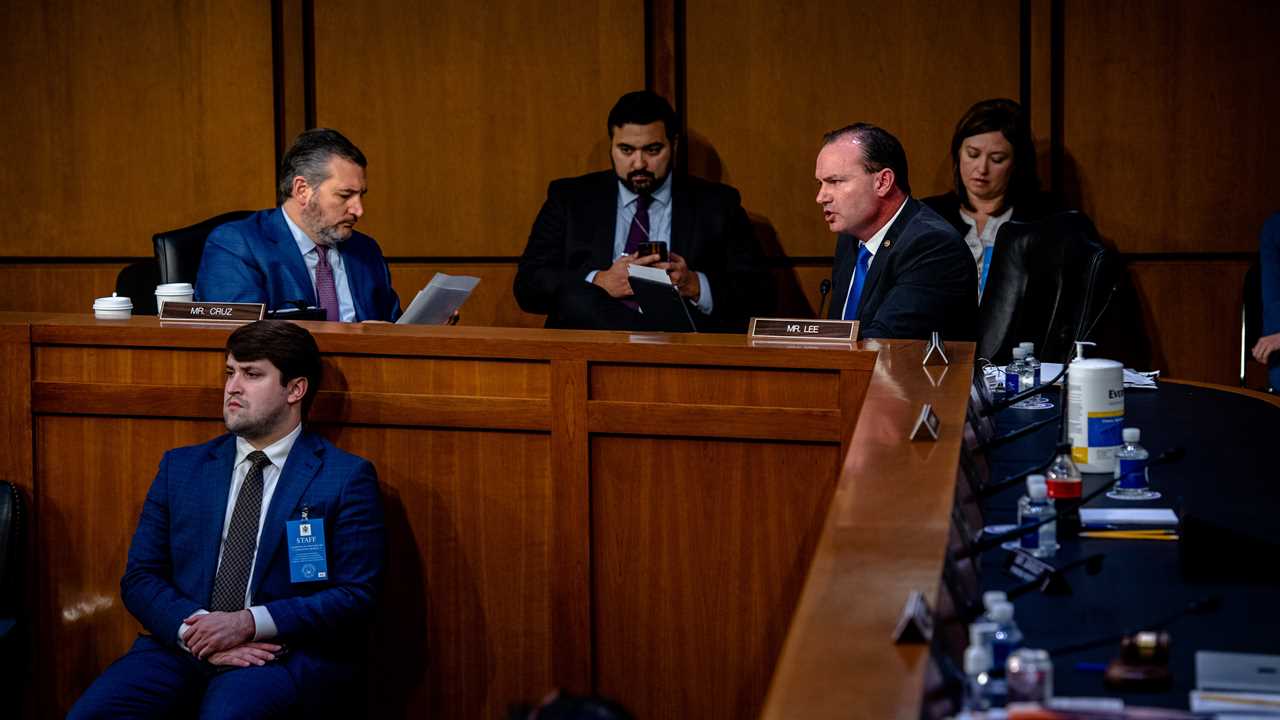
WASHINGTON — One senator asked Judge Ketanji Brown Jackson, President Biden’s Supreme Court pick, how religious she was “on a scale of 1 to 10.” Another asked her to define the word “woman.” A third wanted to know if babies are racist.Supreme Court confirmation hearings have long been criticized as empty rituals, or worse. But the complaints have mostly focused on nominees’ failure to answer questions about how they would rule.The questioning this week has been different and marked by increasing partisan warfare, with Republicans seizing the chance to introduce conservative grievances they intend to press in the midterm elections, including opposition to critical race theory and transgender women in sports.“One thing that is striking about this hearing is how little effort we are seeing to engage the nominee on her views about actual legal issues,” said Lori A. Ringhand, a law professor at the University of Georgia and an author of “Supreme Court Confirmation Hearings and Constitutional Change.”Democratic senators have focused many of their questions on Judge Jackson’s credentials and biography, while Republicans have asked about her work as a public defender, whether some of the sentences she meted out as a trial judge were too lenient and what children should be taught about critical race theory.Questioning at earlier confirmation hearings, by contrast, tended to focus on the nominee’s views on whether there is a constitutional right to abortion and about the other pressing legal issues of the day.Chief Justice John G. Roberts Jr. and Justice Samuel A. Alito Jr. were asked about the scope of executive power in combating terrorism; Justice Brett M. Kavanaugh was asked about investigations of President Donald J. Trump; and Justice Amy Coney Barrett was asked about the fate of the Affordable Care Act.To be sure, the nominees almost uniformly evaded giving definitive answers. But the questions gave them the opportunity to demonstrate their familiarity with the relevant decisions, statutes and doctrines, and lent the proceedings something like a tone of intellectual seriousness.That tone was often absent in Judge Jackson’s hearings. Two decades ago, Justice Neil M. Gorsuch, then a lawyer in private practice, presciently wrote that the modern confirmation process threatened to become “an ideological food fight.”ImageJudge Jackson listening to questions from senators on Wednesday.Credit...Sarahbeth Maney/The New York TimesSupreme Court nominations have, of course, long been the subject of partisanship and acrimony. Republicans blockaded the nomination of Judge Merrick B. Garland in 2016; Justice Kavanaugh in 2018 heatedly denied accusations of sexual assault; and, in the waning days of the Trump administration in 2020, Republicans rushed to confirm Justice Barrett.The old complaint about confirmation hearings was that the nominees were insufficiently responsive. Professor Ringhand said it was difficult to assess Judge Jackson’s performance by that metric.“It is hard to evaluate how responsive she is being relative to other nominees, because so few of the senators’ comments are asking concrete questions about legal issues,” she said. “Instead, we are seeing senators using their time to air disputes with each other, and with the president. That type of bickering always plays some role at the hearings, but there seems to be much more of it this time.”Paul M. Collins Jr., a political scientist at the University of Massachusetts, Amherst, and the other author of the book on confirmation hearings, said Judge Jackson was no more responsive to questions on her legal views than earlier nominees had been.“Judge Jackson took very few solid positions on anything remotely controversial,” he said, adding that Justice Barrett, who was confirmed in 2020, may have served as her model.“In fact,” Professor Collins said, “it seems she closely studied how Justice Barrett handled the committee, and repeatedly referred to Barrett’s responses when dodging the senators’ questions.”At her own confirmation hearing, Justice Barrett cited the so-called Ginsburg rule, named for Justice Ruth Bader Ginsburg, who died in 2020 and whose seat she went on to fill.Questioned by senators in 1993, Justice Ginsburg distilled the responsibilities of nominees into a pithy phrase: “no hints, no forecasts, no previews.”The practice of studied evasion can be traced back to the Senate’s rejection of Judge Robert H. Bork in 1987. His confirmation battle was a turning point in a process that has become increasingly politicized.Nominated by President Ronald Reagan, a Republican, Judge Bork gave extensive answers to the senators’ questions that opened him to attacks as holding views outside the legal mainstream.The Senate, which was controlled byBy: Adam Liptak
Title: The Supreme Court Confirmation Hearing as ‘Ideological Food Fight’
Sourced From: www.nytimes.com/2022/03/23/us/politics/ketanji-brown-jackson-confirmation-hearing.html
Published Date: Wed, 23 Mar 2022 22:30:05 +0000
Read More
Did you miss our previous article...
https://badpoliticians.com/us-politics/the-white-house-fears-most-of-the-democrat
 UK PoliticsWorld PoliticsVideosPrivacy PolicyTerms And Conditions
UK PoliticsWorld PoliticsVideosPrivacy PolicyTerms And Conditions
